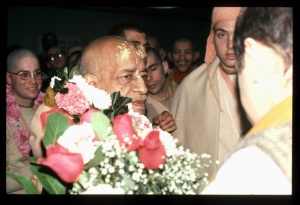Comment of Visva Dharma

A.C. Bhaktivedanta Swami Prabhupada
(This has been proofread against the original. Spelling corrections have been made for Bhaktivedanta VedaBase.—Ed. Bhaktivedanta Archives)
Comment on Viśva Dharma
Śrīman Acharya Visheshanandji a young thoughtful philosopher has very kindly presented to me his book entitled Viśva Dharma. The name is very appropriate because there cannot be more than one path of religion. And if there is only one religion for everyone it must be Viśva Dharma. or the religion for all.
In the Bhāgavatam also it is said that there are many cheating dharmas (kaitava dharma) and all such so-called dharmas are completely rejected in it (Bhāgavatam). In the same way the last word of Bhagavad-gītā is that one should give up all sorts of man-made so-called dharmas and must surrender unto the Lord. The Supreme or Viśva Dharma is therefore nothing but to surrender oneself unto God.
Śrīman Acharya says, "God is one. The path leading to Him is one and the same for one and all. Every sect cannot have a different and exclusive God of his own."
I think that there must be one exclusive God otherwise there is no meaning for "God is one." If God is one He must be exclusive one.* This one God who is exclusively one without any second greater or equal competitor, is described as the Supreme Truth (satyaṁ paraṁ dhīmahi) in the Bhāgavatam.
Śrīman Acharyaji has very appropriately defined dharma as duty. If God is one then our only duty is to obey Him. Obedience to God is the one path leading to Him. Every living being has the tendency of this eternal obedience. Even a crude animal like the tiger is brought into obedience by the trainer. If obedience had not been there in the heart of a tiger or even a snake then it would not have been possible to train such crude living beings. This duty of obedience is developed in human consciousness and this universal consciousness is called dharma in different countries and societies in different manner. Even the Buddhist and similar other religionists who do not believe in God, has the same obedience to Lord Buddha and His laws. Devotion and obedience are two identical terms.
Sriman Acharya says that the difference between (the) living being and the Supreme Soul will be known (at) some later stage. But he has indirectly hinted on the constitution of the living being as follows: "The living being, so long as, forgetting the real character, seeks happiness in natural resources, remains distressed because all the material comforts are changeable and fluctuating and after a certain duration they come to an end."
The Bhagavad-gītā has condemned even the material comforts available in the Brahmaloka the topmost planet of the universe and where life is measured by one day equal to 4,300,000 x 1,000 solar years! One has to return therefore to the spiritual universe where life and every thing is eternal.
The living being, having forgotten his spiritual identity, is seeking peace of mind in matter. This is an impossible fact. A living being of the water cannot be happy on the land at any cost. Similarly the the spirit living being cannot be happy in material existence. He must go Back to Godhead the Supreme Spirit if at all he wants to be happy.
Therefore every living being's duty or dharma is to go back to Godhead which is confirmed in the Bhagavad-gītā as follows: mama...
and that should be the motto of universal religion.
Oṁ Tat Sat.